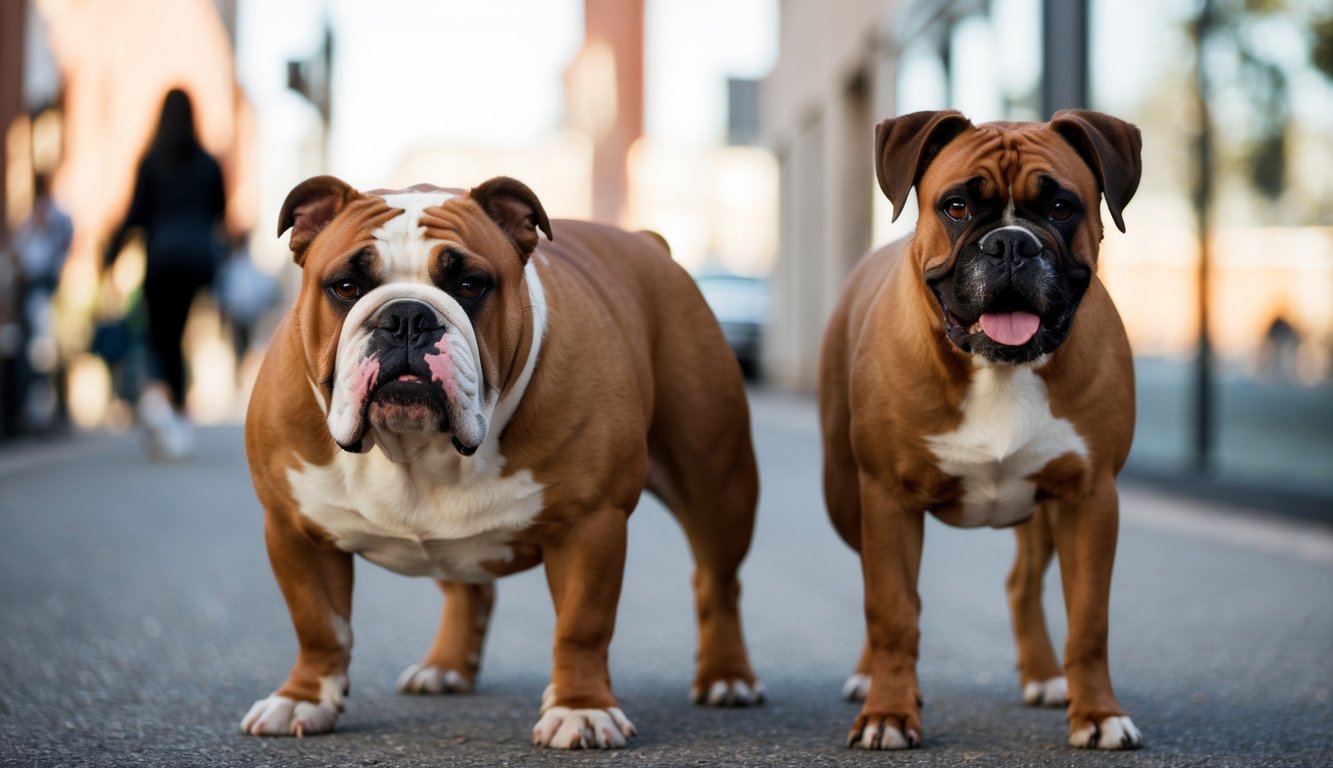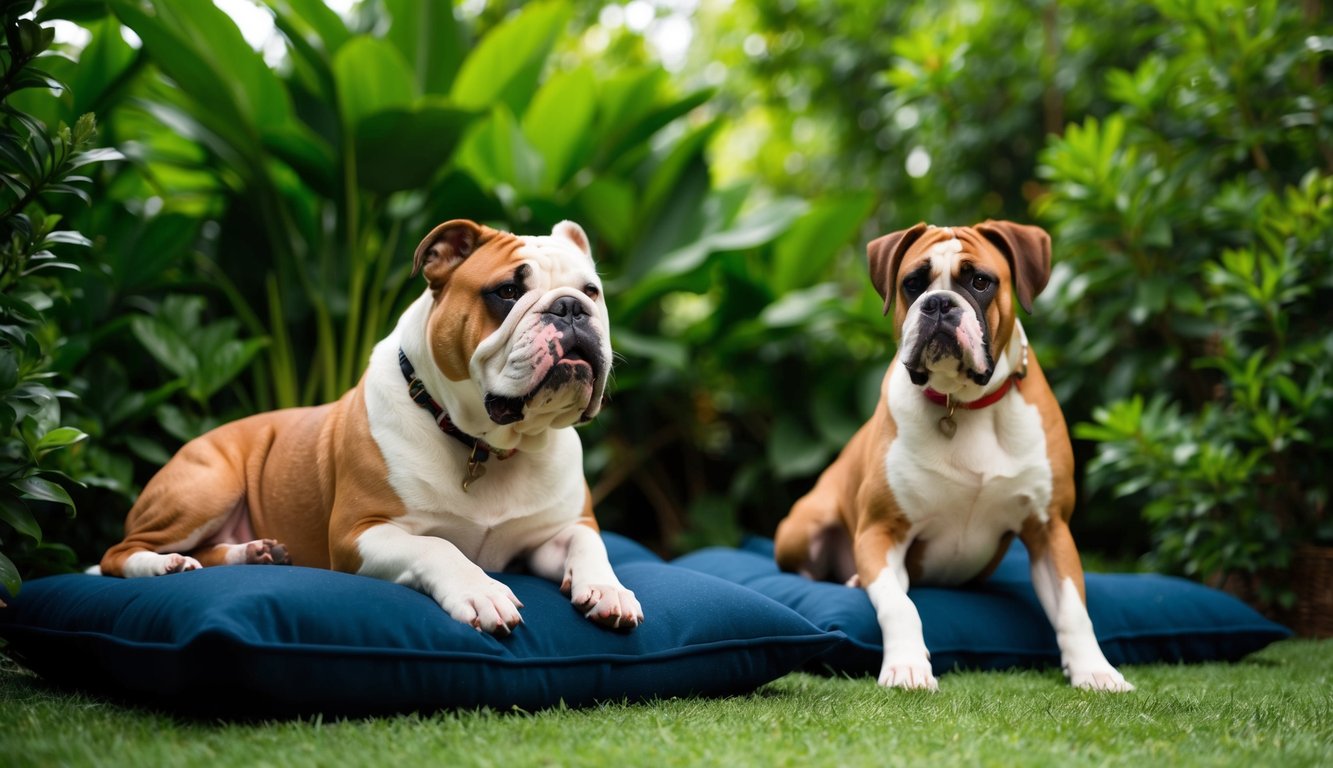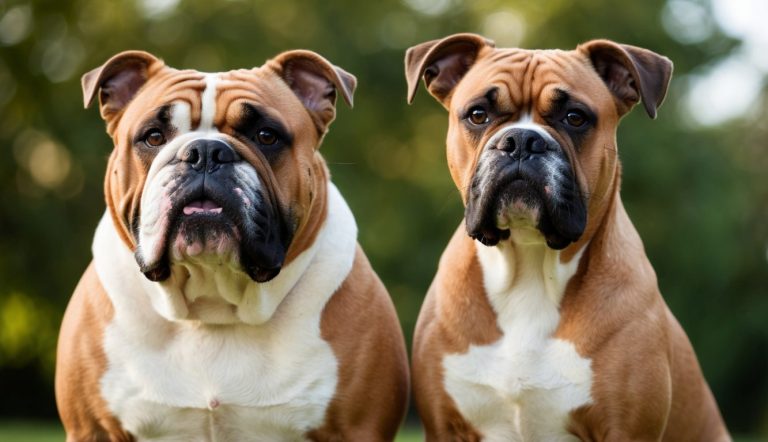Bulldogs and Boxers are distinct dog breeds with unique traits and histories. Each has its own appeal as a family pet. Let’s explore the similarities and differences between these two breeds.
If you’re still on the market to buy a Bulldog or Boxer, PuppySpot currently offers a $300 discount using the code PUPPY300, just click the banner below!
Physical Characteristics
Bulldogs and Boxers have distinct physical traits that set them apart. You’ll notice differences in their size, weight, and coat features.
Bulldog Size and Weight
- Bulldogs come in two main varieties: English and American. English Bulldogs are shorter and more compact. They typically stand 14-15 inches tall at the shoulder. Males weigh 50-55 pounds, while females are slightly lighter at 40-50 pounds.
- American Bulldogs are larger. Males can reach 22-27 inches in height and weigh 75-125 pounds. Females are usually 20-25 inches tall and weigh 60-100 pounds.
- Both types have muscular, stocky builds with broad chests and large heads.
Boxer Size and Weight
Boxers are medium to large dogs with a more athletic build than Bulldogs. Male Boxers stand 23-25 inches tall and weigh 65-80 pounds. Females are slightly smaller, measuring 21.5-23.5 inches in height and weighing 50-65 pounds. Boxers have a square-shaped head, strong jaw, and muscular body. Their legs are longer than Bulldogs’, giving them a more agile appearance.
Coat Type and Colors
Bulldogs and Boxers both have short, smooth coats that are easy to maintain. Bulldogs come in various colors:
- White
- Fawn
- Brindle
- Black and white
- Red and white
Boxers typically have fawn or brindle coats. Some may have white markings. Their coat is tight-fitting and glossy. Both breeds shed moderately and require regular brushing to keep their coats healthy and reduce loose hair.

Temperament and Personality
Bulldogs and Boxers have distinct personalities that suit different lifestyles. Let’s look at how these breeds differ in temperament and energy levels.
Bulldog Temperament
- Bulldogs are known for their calm and gentle nature. You’ll find them to be easygoing and patient, making them great family pets. They’re often content to lounge around the house and don’t need much exercise.
- Bulldogs are typically good with children and other pets. Their laid-back attitude means they’re not easily excited or stressed.
- These dogs can be stubborn at times, but they’re generally eager to please their owners. You’ll find they’re affectionate and form strong bonds with their families.
Boxer Temperament
- Boxers are energetic and playful dogs. You’ll need to provide them with plenty of exercise and mental stimulation. They’re known for their silly antics and love of fun.
- These dogs are very loyal and protective of their families. Boxers are great with kids and often patient with their rough play.
- You’ll find Boxers to be intelligent and trainable, though they can be headstrong at times. They have a high energy level and need regular exercise to stay happy and healthy.
- Boxers are social dogs that enjoy being part of family activities. They can be wary of strangers but are not typically aggressive.
Exercise and Energy Levels
Bulldogs and Boxers have very different exercise needs and energy levels. Knowing these differences can help you choose the right breed for your lifestyle.
Bulldog Exercise Needs
Bulldogs are known for their low energy levels. They don’t need much exercise to stay healthy and happy. A short daily walk of 15-20 minutes is usually enough for a Bulldog. They enjoy playtime but tire quickly. Bulldogs are content with indoor activities. Puzzle toys can keep them mentally stimulated. Be careful not to over-exercise your Bulldog, especially in hot weather. Their flat faces make breathing difficult during intense activity.
Boxer Exercise Needs
- Boxers are highly energetic dogs. They need lots of exercise to stay healthy and well-behaved. You should plan for at least an hour of physical activity each day.
- Boxers excel in agility training and enjoy long walks or runs. They also love interactive play like fetch or tug-of-war. Without enough exercise, Boxers may become destructive or hyperactive.
- Mental stimulation is important too. Try training sessions or puzzle toys to keep your Boxer’s mind active. Regular exercise helps prevent obesity and keeps your Boxer happy and healthy.
Health and Lifespan
Bulldogs and Boxers each face unique health challenges that can affect their lifespan. Both breeds have an average life expectancy of 10-12 years, but certain health issues may shorten this.
Common Health Problems in Bulldogs
- Bulldogs are prone to several health issues due to their unique body structure. Hip dysplasia is a common concern, causing pain and mobility problems. Their flat faces can lead to breathing difficulties and overheating.
- Skin infections are frequent in Bulldogs’ skin folds. Eye problems like cherry eye may occur. Bulldogs can also suffer from allergies and joint issues.
- Regular vet check-ups are crucial for Bulldogs. Maintaining a healthy weight and proper grooming can help prevent some health problems. Be prepared for potential medical costs throughout your Bulldog’s life.
Boxer Health and Cardiomyopathy
- Boxers are generally healthy, but they face some breed-specific health risks. Cardiomyopathy is a serious heart condition that can affect Boxers. Regular heart check-ups are important for early detection.
- Boxers may develop certain cancers, particularly mast cell tumors. They can also experience hip dysplasia and thyroid issues. Some Boxers are prone to allergies and skin problems.
- White Boxers have a higher risk of deafness. Regular exercise and a balanced diet are key to keeping your Boxer healthy. Be aware of signs of illness and schedule routine vet visits to catch any issues early.

Training and Intelligence
Bulldogs and Boxers have different traits when it comes to training and smarts. Let’s look at how easy they are to train and how quick they learn.
Bulldog Trainability
- Bulldogs can be a bit stubborn when it comes to training. You’ll need to be patient and use positive methods to get the best results. Bulldogs are known for their calm nature, which can make training sessions more relaxed.
- Keep training sessions short and fun. Bulldogs get bored easily, so mix things up. Use treats and praise to keep them interested.
- Socialization is key for Bulldogs. Start early to help them get along with people and other pets. With time and effort, you can train your Bulldog to be a well-behaved pet.
Boxer Intelligence and Trainability
Boxers are smart and eager to please. This makes them easier to train than Bulldogs. You don’t need to be an expert to train a Boxer, but they won’t learn everything right away. Boxers love to play and work. Use this to your advantage in training. Keep sessions fun and active to hold their attention.
These dogs do well with:
- Obedience training
- Agility courses
- Trick training
Start socializing your Boxer early. They’re friendly by nature, but proper socialization helps them behave well around others. With consistent training, Boxers can become very obedient and well-mannered pets.
Grooming and Maintenance
Both Bulldogs and Boxers have short coats that need regular care. Their grooming needs differ in some key ways. Let’s look at what each breed requires to stay clean and healthy.
Bulldog Grooming Needs
- Bulldogs need frequent attention to stay clean. You’ll need to wipe their face folds daily with a damp cloth to prevent infections. Brush their coat 2-3 times a week with a soft brush to remove loose hair.
- Bulldogs drool quite a bit, so keep a cloth handy to wipe their mouth. Bathe your Bulldog every 4-6 weeks, or more if they get dirty. Clean their ears weekly and trim nails as needed.
- Don’t forget to brush their teeth several times a week. Bulldogs can have dental issues, so good oral care is a must.
Boxer Grooming and Shedding
- Boxers have an easier grooming routine. Their short coat needs brushing once or twice a week to remove loose hair. They shed moderately year-round, with heavier shedding in spring and fall.
- Bathe your Boxer every 2-3 months or when they get dirty. Clean their ears weekly and trim nails as needed. Boxers drool less than Bulldogs, but you may still need to wipe their mouth sometimes.
- Brush your Boxer’s teeth 2-3 times a week to keep their mouth healthy. Regular grooming helps you bond with your Boxer and check for any skin issues.

Behavioral Traits
Bulldogs and Boxers have distinct personalities that shape their behavior around family and in various situations. Let’s look at how these breeds typically act.
Bulldog Behavior Around Family
- Bulldogs are known for their calm and gentle nature. You’ll find them to be patient and affectionate with family members. They often enjoy lounging around and can be quite lazy at times.
- Bulldogs tend to form strong bonds with their owners. They’re usually good with children and can be tolerant of other pets. However, they may show some stubbornness during training.
- Despite their tough appearance, Bulldogs are not typically aggressive. They’re more likely to greet strangers with curiosity than hostility. Early socialization helps ensure they remain friendly.
Boxer’s Guarding and Protective Instincts
- Boxers have strong protective instincts. You’ll notice they’re always alert and watchful of their surroundings. This makes them excellent guard dogs for your family.
- While protective, Boxers are generally friendly and playful. They form deep bonds with their families and are patient with children. Their high energy levels mean they need plenty of exercise and playtime.
- Boxers can be wary of strangers at first. With proper training, you can ensure they greet new people appropriately. They’re usually good with other dogs but may show dominance if not socialized early.
- Their guarding instincts make Boxers quick to react to perceived threats. You’ll want to train them to respond to your commands to manage these protective behaviors effectively.
Living Environment and Adaptability
Bulldogs and Boxers have different needs when it comes to living spaces and adapting to various environments. Their size, energy levels, and physical characteristics play a role in how well they fit into different homes.
Bulldog Living Environment
- Bulldogs are well-suited for apartment living due to their calm nature. They don’t need a lot of space to be happy and content. You’ll find that Bulldogs are happy with short walks and indoor playtime.
- Bulldogs are sensitive to extreme temperatures. They struggle in hot weather and can overheat easily. In cold weather, they may need a coat to stay warm.
- Keep your Bulldog in a temperature-controlled environment for their comfort and safety. Provide a cozy bed in a quiet area of your home where they can relax.
Boxer Adaptability
- Boxers are more energetic and require more space to move around. They can adapt to apartment living if you provide enough exercise and mental stimulation.
- Your Boxer will thrive with a fenced yard to run and play. They enjoy outdoor activities and need regular exercise to stay healthy and happy.
- Boxers are social dogs and don’t like being left alone for long periods. They prefer to be near their family and may experience anxiety if isolated.
- Consider your lifestyle when choosing a Boxer. They adapt well to various living situations as long as their exercise and social needs are met.





